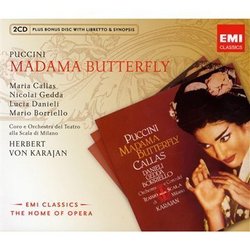| All Artists: Callas, Gedda, Borriello, Danieli Title: Puccini: Madama Butterfly (2 CD/CD-ROM) Members Wishing: 0 Total Copies: 0 Label: EMI Classics Original Release Date: 1/1/2010 Re-Release Date: 4/20/2010 Genre: Classical Style: Opera & Classical Vocal Number of Discs: 3 SwapaCD Credits: 3 UPC: 5099945639821 |
Search - Callas, Gedda, Borriello :: Puccini: Madama Butterfly (2 CD/CD-ROM)
 | Callas, Gedda, Borriello Puccini: Madama Butterfly (2 CD/CD-ROM) Genre: Classical
"Still feeling the impact of that devastating final chord in the opera, I believe devoutly that Madama Butterfly is the most moving of all works for the stage, that this is the best recording of it, and that it is Callas's... more » |
Larger Image |
CD Details
Synopsis
Album Description
"Still feeling the impact of that devastating final chord in the opera, I believe devoutly that Madama Butterfly is the most moving of all works for the stage, that this is the best recording of it, and that it is Callas's greatest achievement on records. The morning after may bring a hesitation or two, but at present belief seems firm as Butterfly's own and a good deal more securely grounded." Synopsis An opera that rarely leaves a proverbial dry eye in the house, Madama Butterfly was first performed in 1904 and set in contemporary Japan. An American naval officer, Pinkerton, has decided to take a Japanese wife, the young geisha Butterfly. He sees the marriage as a temporary arrangement, but Butterfly is completely sincere. After the wedding ceremony, the couple sing an extended and intoxicatingly beautiful love duet. By Act II, three years have passed and Pinkerton has long since returned to the USA, leaving Butterfly with their young son. In `Un bel dì', the most famous number in the score, she sings resolutely to her servant Suzuki of the day that Pinkerton will return. A cannon from Nagasaki harbour announces the arrival of a ship, which Butterfly recognises as Pinkerton's. Overjoyed, she waits overnight with Suzuki and her child, while an offstage chorus hums a serene, but poignant melody. It turns out that Pinkerton has come to Japan with his new American wife, Kate, and intends to take his son away. Like her father before her, Butterfly chooses to die with honour rather than to live with disgrace. After a harrowing farewell to her child, she stabs herself.

 Track Listings (15) - Disc #1
Track Listings (15) - Disc #1